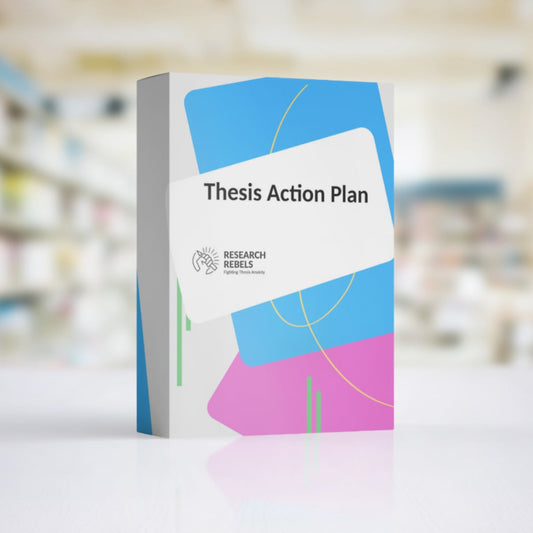Bridging the Gap for Non-Techies: Understanding AI for Your Thesis

Bridging the Gap for Non-Techies: Understanding AI for Your Thesis
Overview
What is AI?
AI, or Artificial Intelligence, is a branch of computer science that focuses on the development of intelligent machines capable of performing tasks that typically require human intelligence. These tasks include speech recognition, decision-making, problem-solving, and learning. AI algorithms, such as machine learning and deep learning, enable computers to analyze large amounts of data, recognize patterns, and make predictions or decisions based on that analysis. AI has the potential to revolutionize various industries, including research and academia, by automating processes, improving efficiency, and providing valuable insights for thesis research.
Why is AI important for your thesis?
AI has become increasingly important in various fields, including academic research. Incorporating AI into your thesis can provide several benefits. Firstly, AI algorithms can help analyze large amounts of data quickly and efficiently, allowing you to uncover patterns and insights that may not be easily identifiable through manual analysis. Secondly, AI can enhance the accuracy and reliability of your research findings by reducing human error and bias. Additionally, AI techniques can enable you to tackle complex problems and explore new research areas that were previously inaccessible. By leveraging AI in your thesis, you can gain a competitive edge and contribute to the advancement of knowledge in your field.
Common misconceptions about AI
There are several common misconceptions about AI that can hinder non-techies from fully understanding its potential. One misconception is that AI will replace human intelligence and take over jobs. However, AI is designed to augment human capabilities, not replace them. Another misconception is that AI is only applicable to advanced scientific research. In reality, AI can be applied to various fields and industries, including social sciences and humanities. Lastly, some people believe that AI is a mysterious and complex technology that is difficult to comprehend. While AI can be complex, understanding the basic concepts and principles can help non-techies grasp its potential and apply it to their thesis research.
Understanding AI Algorithms
Types of AI algorithms
There are several types of AI algorithms that are commonly used in thesis research. These algorithms can be categorized into supervised learning, unsupervised learning, and reinforcement learning. In supervised learning, the algorithm is trained using labeled data to make predictions or classifications. Unsupervised learning algorithms, on the other hand, analyze unlabeled data to discover patterns or relationships. Lastly, reinforcement learning algorithms learn through trial and error, receiving feedback on their actions to improve performance. Each type of algorithm has its own strengths and weaknesses, and the choice of algorithm depends on the specific research problem and data available.
How AI algorithms work
AI algorithms work by processing large amounts of data and using statistical techniques to identify patterns and make predictions. These algorithms are designed to mimic human intelligence and can be categorized into different types, such as supervised learning, unsupervised learning, and reinforcement learning. Supervised learning algorithms are trained on labeled data, where the desired output is known, while unsupervised learning algorithms discover patterns in unlabeled data. Reinforcement learning algorithms learn through trial and error, receiving feedback on their actions. The performance of AI algorithms is evaluated using metrics like accuracy, precision, and recall. It is important to understand how AI algorithms work in order to effectively apply them in your thesis research.
Evaluating the performance of AI algorithms
When evaluating the performance of AI algorithms, it is important to consider various metrics such as accuracy, precision, recall, and F1 score. These metrics provide insights into the algorithm's ability to correctly classify and predict outcomes. Additionally, it is crucial to compare the performance of different algorithms using techniques like cross-validation and hypothesis testing. By carefully evaluating the performance of AI algorithms, researchers can ensure that their thesis work is based on reliable and effective AI models.
Applying AI in Your Thesis
Identifying research areas where AI can be applied
AI has the potential to revolutionize various research areas, offering new insights and solutions. Some of the fields where AI can be applied include healthcare, finance, education, marketing, and environmental science. In healthcare, AI can assist in diagnosing diseases and predicting patient outcomes. In finance, AI can be used for fraud detection and risk assessment. In education, AI can personalize learning experiences and provide intelligent tutoring. In marketing, AI can analyze consumer behavior and optimize advertising campaigns. In environmental science, AI can help in monitoring and managing natural resources. Researchers should explore these areas and consider how AI can enhance their thesis research.
Choosing the right AI tools and techniques
When it comes to choosing the right AI tools and techniques for your thesis, it is important to consider the specific requirements of your research area. Machine learning algorithms, such as supervised learning, unsupervised learning, and reinforcement learning, can be applied to various tasks, including classification, regression, and clustering. Additionally, natural language processing techniques, such as text classification and sentiment analysis, can be useful for analyzing textual data. It is crucial to evaluate the performance of different AI algorithms and techniques to ensure their suitability for your research objectives. Furthermore, exploring open-source AI libraries and frameworks, such as TensorFlow and PyTorch, can provide you with a wide range of tools and resources to facilitate your AI analysis.
Collecting and preparing data for AI analysis
To effectively apply AI in your thesis, it is crucial to collect and prepare data that is relevant and of high quality. Start by identifying the research areas where AI can be applied in your field of study. Once you have identified the research areas, choose the right AI tools and techniques that align with your research objectives. Additionally, ensure that you have a diverse and representative dataset to train your AI model. This involves collecting data from reliable sources and preparing it by cleaning, filtering, and normalizing the data. By taking these steps, you can ensure that your AI analysis is based on reliable and accurate data, leading to meaningful insights for your thesis.
Conclusion
Key takeaways
After understanding the basics of AI and its importance in thesis research, it is essential to keep in mind some key takeaways. Firstly, AI algorithms can be categorized into different types, such as supervised learning, unsupervised learning, and reinforcement learning. Each type has its own strengths and weaknesses, and it is crucial to choose the right algorithm for your research. Secondly, evaluating the performance of AI algorithms is essential to ensure their effectiveness and reliability. This can be done by using metrics like accuracy, precision, recall, and F1 score. Lastly, when applying AI in your thesis, it is important to collect and prepare data properly. This includes data cleaning, data preprocessing, and feature engineering. By following these key takeaways, you can successfully incorporate AI into your thesis research and enhance its impact.
Future implications of AI in thesis research
The future implications of AI in thesis research are vast and exciting. With the advancements in AI technology, researchers can leverage AI algorithms to analyze large datasets and uncover valuable insights. AI can assist in automating repetitive tasks, saving researchers time and effort. Additionally, AI can enhance the accuracy and efficiency of data analysis, leading to more reliable research findings. However, it is important for researchers to be aware of the limitations and ethical considerations associated with AI. Ethical guidelines should be followed to ensure fairness, transparency, and accountability in AI-powered research. Overall, AI has the potential to revolutionize thesis research and open up new avenues for exploration and discovery.
Final thoughts
In conclusion, understanding and utilizing AI in your thesis research can greatly enhance your work and provide valuable insights. By identifying research areas where AI can be applied, choosing the right AI tools and techniques, and collecting and preparing data for AI analysis, you can leverage the power of AI to solve complex problems and make significant contributions to your field. However, it is important to keep in mind that AI is not a magic solution and has its limitations. It is crucial to critically evaluate the performance of AI algorithms and interpret the results with caution. As AI continues to advance, it is exciting to think about the future implications it will have on thesis research. Embracing AI and staying updated with the latest developments in the field will undoubtedly open up new possibilities and opportunities for non-techies to bridge the gap and make meaningful contributions to the world of AI research.
Bridging the Gap for Non-Techies: Understanding AI for Your Thesis

Bridging the Gap for Non-Techies: Understanding AI for Your Thesis
Overview
What is AI?
AI, or Artificial Intelligence, is a branch of computer science that focuses on the development of intelligent machines capable of performing tasks that typically require human intelligence. These tasks include speech recognition, decision-making, problem-solving, and learning. AI algorithms, such as machine learning and deep learning, enable computers to analyze large amounts of data, recognize patterns, and make predictions or decisions based on that analysis. AI has the potential to revolutionize various industries, including research and academia, by automating processes, improving efficiency, and providing valuable insights for thesis research.
Why is AI important for your thesis?
AI has become increasingly important in various fields, including academic research. Incorporating AI into your thesis can provide several benefits. Firstly, AI algorithms can help analyze large amounts of data quickly and efficiently, allowing you to uncover patterns and insights that may not be easily identifiable through manual analysis. Secondly, AI can enhance the accuracy and reliability of your research findings by reducing human error and bias. Additionally, AI techniques can enable you to tackle complex problems and explore new research areas that were previously inaccessible. By leveraging AI in your thesis, you can gain a competitive edge and contribute to the advancement of knowledge in your field.
Common misconceptions about AI
There are several common misconceptions about AI that can hinder non-techies from fully understanding its potential. One misconception is that AI will replace human intelligence and take over jobs. However, AI is designed to augment human capabilities, not replace them. Another misconception is that AI is only applicable to advanced scientific research. In reality, AI can be applied to various fields and industries, including social sciences and humanities. Lastly, some people believe that AI is a mysterious and complex technology that is difficult to comprehend. While AI can be complex, understanding the basic concepts and principles can help non-techies grasp its potential and apply it to their thesis research.
Understanding AI Algorithms
Types of AI algorithms
There are several types of AI algorithms that are commonly used in thesis research. These algorithms can be categorized into supervised learning, unsupervised learning, and reinforcement learning. In supervised learning, the algorithm is trained using labeled data to make predictions or classifications. Unsupervised learning algorithms, on the other hand, analyze unlabeled data to discover patterns or relationships. Lastly, reinforcement learning algorithms learn through trial and error, receiving feedback on their actions to improve performance. Each type of algorithm has its own strengths and weaknesses, and the choice of algorithm depends on the specific research problem and data available.
How AI algorithms work
AI algorithms work by processing large amounts of data and using statistical techniques to identify patterns and make predictions. These algorithms are designed to mimic human intelligence and can be categorized into different types, such as supervised learning, unsupervised learning, and reinforcement learning. Supervised learning algorithms are trained on labeled data, where the desired output is known, while unsupervised learning algorithms discover patterns in unlabeled data. Reinforcement learning algorithms learn through trial and error, receiving feedback on their actions. The performance of AI algorithms is evaluated using metrics like accuracy, precision, and recall. It is important to understand how AI algorithms work in order to effectively apply them in your thesis research.
Evaluating the performance of AI algorithms
When evaluating the performance of AI algorithms, it is important to consider various metrics such as accuracy, precision, recall, and F1 score. These metrics provide insights into the algorithm's ability to correctly classify and predict outcomes. Additionally, it is crucial to compare the performance of different algorithms using techniques like cross-validation and hypothesis testing. By carefully evaluating the performance of AI algorithms, researchers can ensure that their thesis work is based on reliable and effective AI models.
Applying AI in Your Thesis
Identifying research areas where AI can be applied
AI has the potential to revolutionize various research areas, offering new insights and solutions. Some of the fields where AI can be applied include healthcare, finance, education, marketing, and environmental science. In healthcare, AI can assist in diagnosing diseases and predicting patient outcomes. In finance, AI can be used for fraud detection and risk assessment. In education, AI can personalize learning experiences and provide intelligent tutoring. In marketing, AI can analyze consumer behavior and optimize advertising campaigns. In environmental science, AI can help in monitoring and managing natural resources. Researchers should explore these areas and consider how AI can enhance their thesis research.
Choosing the right AI tools and techniques
When it comes to choosing the right AI tools and techniques for your thesis, it is important to consider the specific requirements of your research area. Machine learning algorithms, such as supervised learning, unsupervised learning, and reinforcement learning, can be applied to various tasks, including classification, regression, and clustering. Additionally, natural language processing techniques, such as text classification and sentiment analysis, can be useful for analyzing textual data. It is crucial to evaluate the performance of different AI algorithms and techniques to ensure their suitability for your research objectives. Furthermore, exploring open-source AI libraries and frameworks, such as TensorFlow and PyTorch, can provide you with a wide range of tools and resources to facilitate your AI analysis.
Collecting and preparing data for AI analysis
To effectively apply AI in your thesis, it is crucial to collect and prepare data that is relevant and of high quality. Start by identifying the research areas where AI can be applied in your field of study. Once you have identified the research areas, choose the right AI tools and techniques that align with your research objectives. Additionally, ensure that you have a diverse and representative dataset to train your AI model. This involves collecting data from reliable sources and preparing it by cleaning, filtering, and normalizing the data. By taking these steps, you can ensure that your AI analysis is based on reliable and accurate data, leading to meaningful insights for your thesis.
Conclusion
Key takeaways
After understanding the basics of AI and its importance in thesis research, it is essential to keep in mind some key takeaways. Firstly, AI algorithms can be categorized into different types, such as supervised learning, unsupervised learning, and reinforcement learning. Each type has its own strengths and weaknesses, and it is crucial to choose the right algorithm for your research. Secondly, evaluating the performance of AI algorithms is essential to ensure their effectiveness and reliability. This can be done by using metrics like accuracy, precision, recall, and F1 score. Lastly, when applying AI in your thesis, it is important to collect and prepare data properly. This includes data cleaning, data preprocessing, and feature engineering. By following these key takeaways, you can successfully incorporate AI into your thesis research and enhance its impact.
Future implications of AI in thesis research
The future implications of AI in thesis research are vast and exciting. With the advancements in AI technology, researchers can leverage AI algorithms to analyze large datasets and uncover valuable insights. AI can assist in automating repetitive tasks, saving researchers time and effort. Additionally, AI can enhance the accuracy and efficiency of data analysis, leading to more reliable research findings. However, it is important for researchers to be aware of the limitations and ethical considerations associated with AI. Ethical guidelines should be followed to ensure fairness, transparency, and accountability in AI-powered research. Overall, AI has the potential to revolutionize thesis research and open up new avenues for exploration and discovery.
Final thoughts
In conclusion, understanding and utilizing AI in your thesis research can greatly enhance your work and provide valuable insights. By identifying research areas where AI can be applied, choosing the right AI tools and techniques, and collecting and preparing data for AI analysis, you can leverage the power of AI to solve complex problems and make significant contributions to your field. However, it is important to keep in mind that AI is not a magic solution and has its limitations. It is crucial to critically evaluate the performance of AI algorithms and interpret the results with caution. As AI continues to advance, it is exciting to think about the future implications it will have on thesis research. Embracing AI and staying updated with the latest developments in the field will undoubtedly open up new possibilities and opportunities for non-techies to bridge the gap and make meaningful contributions to the world of AI research.
Bridging the Gap for Non-Techies: Understanding AI for Your Thesis

Bridging the Gap for Non-Techies: Understanding AI for Your Thesis
Overview
What is AI?
AI, or Artificial Intelligence, is a branch of computer science that focuses on the development of intelligent machines capable of performing tasks that typically require human intelligence. These tasks include speech recognition, decision-making, problem-solving, and learning. AI algorithms, such as machine learning and deep learning, enable computers to analyze large amounts of data, recognize patterns, and make predictions or decisions based on that analysis. AI has the potential to revolutionize various industries, including research and academia, by automating processes, improving efficiency, and providing valuable insights for thesis research.
Why is AI important for your thesis?
AI has become increasingly important in various fields, including academic research. Incorporating AI into your thesis can provide several benefits. Firstly, AI algorithms can help analyze large amounts of data quickly and efficiently, allowing you to uncover patterns and insights that may not be easily identifiable through manual analysis. Secondly, AI can enhance the accuracy and reliability of your research findings by reducing human error and bias. Additionally, AI techniques can enable you to tackle complex problems and explore new research areas that were previously inaccessible. By leveraging AI in your thesis, you can gain a competitive edge and contribute to the advancement of knowledge in your field.
Common misconceptions about AI
There are several common misconceptions about AI that can hinder non-techies from fully understanding its potential. One misconception is that AI will replace human intelligence and take over jobs. However, AI is designed to augment human capabilities, not replace them. Another misconception is that AI is only applicable to advanced scientific research. In reality, AI can be applied to various fields and industries, including social sciences and humanities. Lastly, some people believe that AI is a mysterious and complex technology that is difficult to comprehend. While AI can be complex, understanding the basic concepts and principles can help non-techies grasp its potential and apply it to their thesis research.
Understanding AI Algorithms
Types of AI algorithms
There are several types of AI algorithms that are commonly used in thesis research. These algorithms can be categorized into supervised learning, unsupervised learning, and reinforcement learning. In supervised learning, the algorithm is trained using labeled data to make predictions or classifications. Unsupervised learning algorithms, on the other hand, analyze unlabeled data to discover patterns or relationships. Lastly, reinforcement learning algorithms learn through trial and error, receiving feedback on their actions to improve performance. Each type of algorithm has its own strengths and weaknesses, and the choice of algorithm depends on the specific research problem and data available.
How AI algorithms work
AI algorithms work by processing large amounts of data and using statistical techniques to identify patterns and make predictions. These algorithms are designed to mimic human intelligence and can be categorized into different types, such as supervised learning, unsupervised learning, and reinforcement learning. Supervised learning algorithms are trained on labeled data, where the desired output is known, while unsupervised learning algorithms discover patterns in unlabeled data. Reinforcement learning algorithms learn through trial and error, receiving feedback on their actions. The performance of AI algorithms is evaluated using metrics like accuracy, precision, and recall. It is important to understand how AI algorithms work in order to effectively apply them in your thesis research.
Evaluating the performance of AI algorithms
When evaluating the performance of AI algorithms, it is important to consider various metrics such as accuracy, precision, recall, and F1 score. These metrics provide insights into the algorithm's ability to correctly classify and predict outcomes. Additionally, it is crucial to compare the performance of different algorithms using techniques like cross-validation and hypothesis testing. By carefully evaluating the performance of AI algorithms, researchers can ensure that their thesis work is based on reliable and effective AI models.
Applying AI in Your Thesis
Identifying research areas where AI can be applied
AI has the potential to revolutionize various research areas, offering new insights and solutions. Some of the fields where AI can be applied include healthcare, finance, education, marketing, and environmental science. In healthcare, AI can assist in diagnosing diseases and predicting patient outcomes. In finance, AI can be used for fraud detection and risk assessment. In education, AI can personalize learning experiences and provide intelligent tutoring. In marketing, AI can analyze consumer behavior and optimize advertising campaigns. In environmental science, AI can help in monitoring and managing natural resources. Researchers should explore these areas and consider how AI can enhance their thesis research.
Choosing the right AI tools and techniques
When it comes to choosing the right AI tools and techniques for your thesis, it is important to consider the specific requirements of your research area. Machine learning algorithms, such as supervised learning, unsupervised learning, and reinforcement learning, can be applied to various tasks, including classification, regression, and clustering. Additionally, natural language processing techniques, such as text classification and sentiment analysis, can be useful for analyzing textual data. It is crucial to evaluate the performance of different AI algorithms and techniques to ensure their suitability for your research objectives. Furthermore, exploring open-source AI libraries and frameworks, such as TensorFlow and PyTorch, can provide you with a wide range of tools and resources to facilitate your AI analysis.
Collecting and preparing data for AI analysis
To effectively apply AI in your thesis, it is crucial to collect and prepare data that is relevant and of high quality. Start by identifying the research areas where AI can be applied in your field of study. Once you have identified the research areas, choose the right AI tools and techniques that align with your research objectives. Additionally, ensure that you have a diverse and representative dataset to train your AI model. This involves collecting data from reliable sources and preparing it by cleaning, filtering, and normalizing the data. By taking these steps, you can ensure that your AI analysis is based on reliable and accurate data, leading to meaningful insights for your thesis.
Conclusion
Key takeaways
After understanding the basics of AI and its importance in thesis research, it is essential to keep in mind some key takeaways. Firstly, AI algorithms can be categorized into different types, such as supervised learning, unsupervised learning, and reinforcement learning. Each type has its own strengths and weaknesses, and it is crucial to choose the right algorithm for your research. Secondly, evaluating the performance of AI algorithms is essential to ensure their effectiveness and reliability. This can be done by using metrics like accuracy, precision, recall, and F1 score. Lastly, when applying AI in your thesis, it is important to collect and prepare data properly. This includes data cleaning, data preprocessing, and feature engineering. By following these key takeaways, you can successfully incorporate AI into your thesis research and enhance its impact.
Future implications of AI in thesis research
The future implications of AI in thesis research are vast and exciting. With the advancements in AI technology, researchers can leverage AI algorithms to analyze large datasets and uncover valuable insights. AI can assist in automating repetitive tasks, saving researchers time and effort. Additionally, AI can enhance the accuracy and efficiency of data analysis, leading to more reliable research findings. However, it is important for researchers to be aware of the limitations and ethical considerations associated with AI. Ethical guidelines should be followed to ensure fairness, transparency, and accountability in AI-powered research. Overall, AI has the potential to revolutionize thesis research and open up new avenues for exploration and discovery.
Final thoughts
In conclusion, understanding and utilizing AI in your thesis research can greatly enhance your work and provide valuable insights. By identifying research areas where AI can be applied, choosing the right AI tools and techniques, and collecting and preparing data for AI analysis, you can leverage the power of AI to solve complex problems and make significant contributions to your field. However, it is important to keep in mind that AI is not a magic solution and has its limitations. It is crucial to critically evaluate the performance of AI algorithms and interpret the results with caution. As AI continues to advance, it is exciting to think about the future implications it will have on thesis research. Embracing AI and staying updated with the latest developments in the field will undoubtedly open up new possibilities and opportunities for non-techies to bridge the gap and make meaningful contributions to the world of AI research.

















